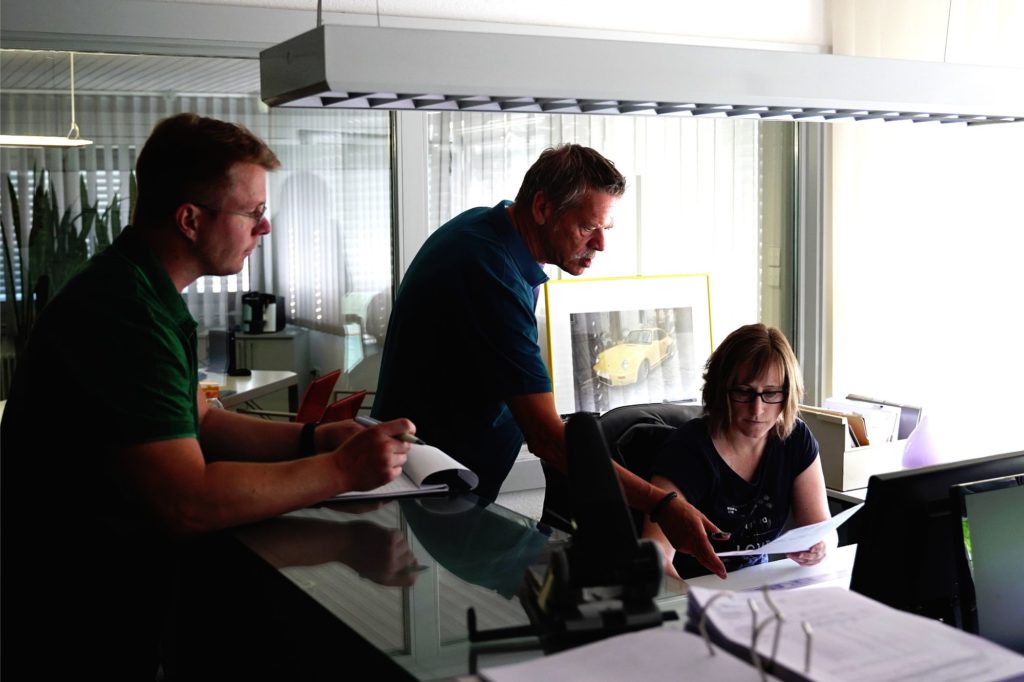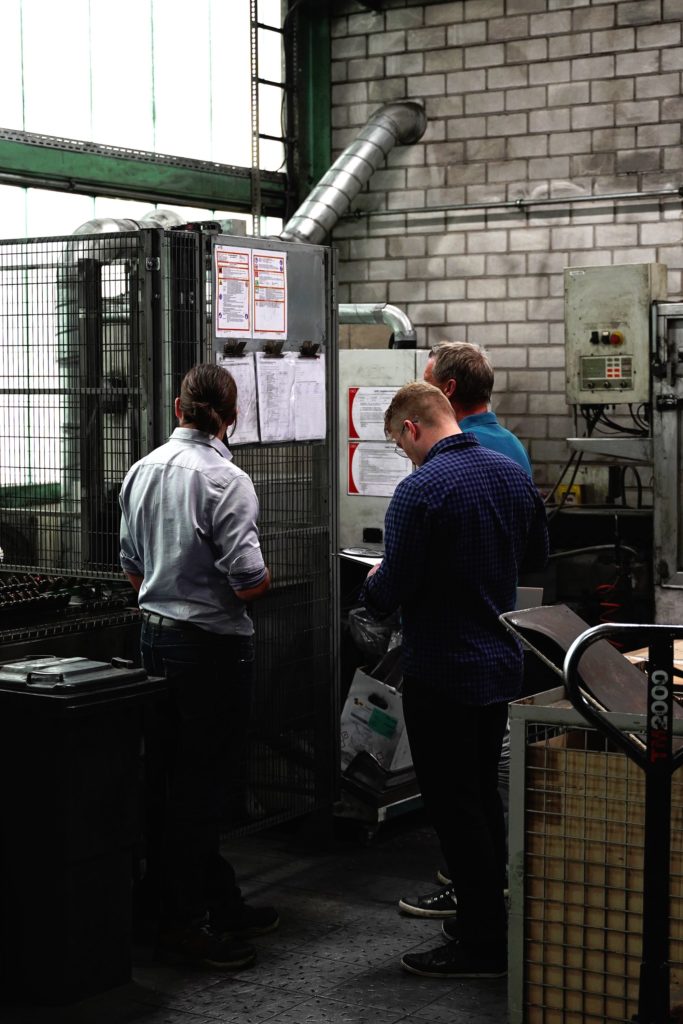ISO 9001 Certification - Quality Management
Furthermore, the systematic performance description in quality management leads to reliable product quality - not least because processes are better managed and management can make well-founded decisions thanks to the transparency of the processes.
Of decisive importance, especially in today's times of permanent change, is the fact that systematic quality management enables companies to respond better to complex requirements and to changes in the market. In doing so, the system protects against risks and serves to learn from mistakes instead of repeating them, and to recognize opportunities. Efficiency with a long-term effect at lower overall costs is thus guaranteed.
Now you are probably wondering which certifier is the right one for a quality management certification. Why should you choose X.CERT® and get certified for ISO 9001? X.CERT® is specialized in SMEs and offers you, as a certifier, a simple and efficient assessment of compliance and the further development of management systems. With our high quality certificates you not only create confidence in the market, improve your image, but also make sure that you stay on the right track.
X.CERT® is characterized by the diversity of its audit team. Here, many years of experience ,of internationally recognized auditors, in conducting external and internal audits meet the latest scientific findings, supported by the experience of the regional university and professional experience from the point of view of quality management representatives from practice. The interaction of these different perspectives of X.CERT® makes up the unique competence, which helps you to discover and promote improvement potential in your company through an intensive investigation.
The philosophy of X.CERT® is to add value to the company with its assessment and to support it in its development.
Due to the fast pace of change both within society and at the legislative level, it is often difficult to keep up to date in relation to management systems. We regularly inform you about emerging changes in standards, trends and innovations in order to stay up to date. Under our news and blog entries you will not only find exciting articles about our activities, but also information about interesting projects of our partners.
Contact us now and get an individual and non-binding offer for quality management certification.
Ready for ISO 9001 certification?
Basics of quality management
Plan - Do - Check - Act
Plan, Do, Check, Act. These are the four magic words of DIN EN ISO 9001:2015. The so-called PDCA cycle is designed to help companies work in a customer- and process-oriented manner.
As a successful company, you focus on your most important target group - your customers. However, the environment of your organization also plays an important role.
Do you know all the stakeholders of your company? Many companies underestimate the importance of their environment. Knowing which interested parties have an influence on your company and which important topics they are concerned with helps to derive and define the scope of quality management. In today's world not only customer satisfaction in connection with your products or services contributes to a good image, but also the interaction with authorities, suppliers and neighbors.
By analyzing your environment, you will know where the focal points in your company lie and in which area your quality-relevant processes can be found. In this way, you can recognize where you need to direct your energy so that continuous improvement of processes can occur.
You have been setting goals for many years, but achieve them only with difficulty or hardly at all? Here an assessment can be the way to the solution. Sometimes it already helps to structure and schedule the goals or to check their feasibility.
All beginnings are difficult, but once the first smaller goals have been achieved, motivation quickly grows and the bigger ones are within reach. Of course, it is necessary in this context that processes and measures in the company are scrutinized more closely.
Through a quality management certification (appraisal), your measures are regularly checked for effectiveness and encouraged to continuously improve.
In order for processes to be economically viable and lucrative in the long run, constant monitoring, various optimizations and adjustments are required. This means that processes must be streamlined, interfaces adapted and procedures described in detail.
But this is usually easier said than done, because processes have often existed for many years, are hardly ever questioned and the well-known operational blindness arises. This is where an external view, e.g. from an independent third party, can help. He recognizes weak points, but also the strengths of your company.
Through an assessment, processes are screened and analyzed, and sources of error are identified. Through the risk-based approach, which looks at the opportunities and risks of processes, you can weigh up or obtain confirmation of where and how urgently action is needed. With this support, it is easier for you to eliminate weaknesses or build on strengths.
Not only precisely described activities help your employees to familiarize themselves efficiently or quickly, but also the defined distribution of responsibilities. But here, too, an analyzing person who does not explicitly know the processes is an advantage, because he or she will objectively notice problems in the description more easily. With this new knowledge, you can identify duplicate work and avoid it. This in turn also increases the motivation of your employees, which is a decisive influence on the productivity of your organization. In order to develop and train employees, regular trainings are indispensable.
The choice is very important, because they are usually associated with a lot of costs. In this context, the standard requires you to evaluate the effectiveness of the training you provide. This helps in assessing whether you have invested your money well. Your certifier will also check whether the selected training courses are appropriate, meaningful and fit for purpose, and can thus give you indications of where there is potential for improvement.
Häufige Fragen zur Zertifizierung
Jeder Zertifizierungsprozess ist individuell und einzigartig. In der Regel dauert der gesamte Prozess mit der X.CERT® von der ersten Beratung, über die Einführung bis hin zur erfolgreichen ISO Zertifizierung 3-6 Monate. Hierfür können verschiedene staatliche Förderungen in Anspruch genommen werden.
Die Gültigkeit eines Zertifikats beträgt 3 Jahre und kann durch eine Re-Zertifizierung um weitere 3 Jahre verlängert werden.
Ein Rezertifizierungsaudit ist das Audit, welches durchgeführt wird, wenn der vorhergehende Zertifizierungszylkus abgeschlossen ist und eine weitere Zertifizierung nach DIN EN ISO 9001 gewünscht bzw. gefordert ist.
Details zum Rezertifizierungsaudit
Ein Rezertifizierungsaudit ist (ebenso wie ein Zertifizierungsaudit und ein Überwachungsaudit) ein Systemaudit.
Auch bei einem Rezertifizierungsaudit ist die Auditdauer, sowie die Anzahl der Auditoren von der zu auditierenden Unternehmensgröße bzw. Organisationsgröße abhängig. Ein Rezertifizierungsaudit prüft (anders als ein Überwachungsaudit) wieder das komplette Qualitätsmanagementsystem.
Auch ein Rezertifizierungsaudit wird in der Regel nach einem Auditplan durchgeführt. Dieser Auditplan wird dem zu auditirenden Unternehmen bzw. Organisation im Vorwege von der Zertifizierungsgesellschaft zur Verfügung gestellt.





